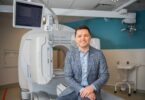Loneliness is emerging as a public health crisis around the world. Loneliness now affects 1 in 4 people, and the UK recently appointed a Minister for Loneliness. While there’s recently been more attention given to the plight of lonely seniors, loneliness can also impact young people and adults.
“We’re seeing more anxiety and depression in young people, with many of them reporting feelings of loneliness,” says Dr. Carolyn Boulos, a child and adolescent psychiatrist at Sunnybrook and assistant professor at University of Toronto.
Shyness as a child can become social anxiety as an adolescent or adult
Children may worry about making friends at a new school, or teenagers may worry about being judged by their peers. As we get older, this may result in social anxiety, making it difficult to practice social skills and causing us to feel more isolated.
FOMO is real
Fear of missing out (FOMO) is alive and well.
“A young person who is feeling lonely may see their friends post about the fun and interesting things they’re doing on social media, making the feeling of loneliness intensify,” says Dr. Boulos.
Parents can be lonely, too
Young people who report feelings of loneliness may lack the ability to develop intimacy in relationships, particularly if their parents have had similar upbringing. Lacking these tools may make it difficult to know how to navigate and build social relationships.
“Parents can be lonely too,” says Dr. Boulos. “Perhaps their relationship has ended, or they are feeling misunderstood by their partners or children. Parents should model healthy behaviours within their relationships, as their children are likely to copy what they see.”
Social media is a blessing and a curse
Social media may connect us, but are these connections meaningful? Apps and texting can be useful tools to supplement communication, but it shouldn’t become the primary way that we connect with one another.
“Someone who doesn’t feel comfortable socializing in person may find others online to connect with, but these are not physical friends. The opportunity to learn and practice social cues is lacking.” says Dr. Boulos.
So, what can we do to combat feelings of loneliness? Dr. Boulos has a few tips:
1) Make a date – with your child, parents, family or friends
Not all dates need to be romantic. Take time to reconnect with people who are important in your life.
“It’s important to show kindness and respect to each other, and that starts with taking time to talk and listen to one another without distractions,” says Dr. Boulos.
Doing something together could be as simple as going for a walk, going bowling, grabbing a coffee or participating in shared interests.
2) Set aside some time with others, without the screens
With all the time we spend on our phones and in front of screens, Dr. Boulos is noticing that more patients have a harder time making eye contact.
“Young people are losing the ability to identify social cues because they’re constantly in front of a screen. Parents are using technology more too, meaning that overall, there is far less casual conversation going on, whether it’s in the car or at the dinner table,” she says.
Make time away from the screens to reconnect, have a conversation, share a meal – all of these things will help to keep feelings of loneliness at bay, and build intimacy and understanding in relationships.
3) Physical touch is important
As our communications are becoming more often electronic, it’s important as social beings that we retain human contact – this helps us remain connected to others and to not feel lonely.
“Chemically, a lot of important things happen in our bodies when we touch, even if it’s just a quick hug,” says Dr. Boulos. “Touch can provide a sense of intimacy, security and happiness, as well as decrease stress and improve our overall health.”
More on the topic:
Infographic: How loneliness affects our health
It is important to know that you are not alone. If you or someone you know is suffering, help is available. Find resources and information at sunnybrook.ca/gethelp








